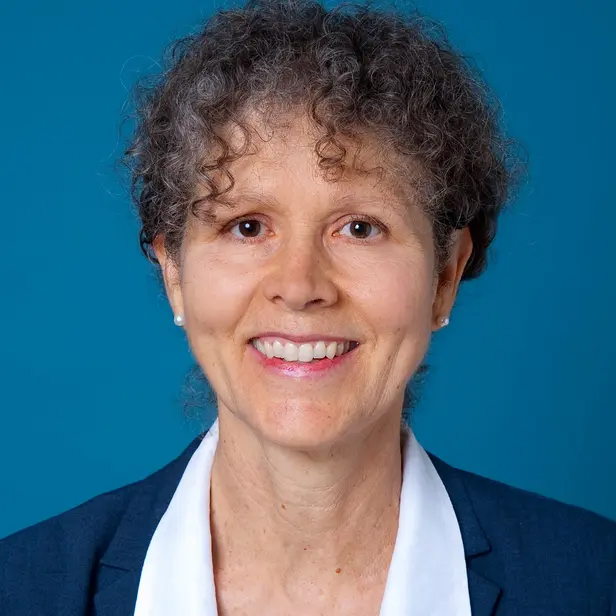NCCIH 25th Anniversary Celebration: Speaker Bios
The following speakers will participate in the NCCIH 25th Anniversary Symposium.

Kelly Champney, J.D.
Vice President Managed Care Contracting
The University of Vermont Health Network
Kelly Champney, J.D., is the former director of healthcare reform at Blue Cross Blue Shield (BCBS) of Vermont. She worked for BCBS of Vermont for almost 13 years, starting as provider and network contracting counsel and eventually moving into the role of representing the insurer in health reform matters, from accountable care organization provider arrangements to deployment of pilot programs addressing mental health and substance abuse treatment. She served on several committees including the Blueprint for Health Executive Committee and the initial Vermont’s Health Information Exchange Steering Committee. She is now the vice president of managed care contracting for the University of Vermont Health Network.
Prior to working at BCBS of Vermont, Ms. Champney was a practicing attorney in Rutland, Vermont, focusing on medical malpractice and workers’ compensation defense and regulatory matters. She received a Bachelor of Science degree in biology from The George Washington University in Washington, D.C. and earned her J.D. from Western New England School of Law.
Lynn DeBar, Ph.D., M.P.H.
Distinguished Investigator
Center for Health Research
Kaiser Permanente Northwest
Lynn DeBar, Ph.D., is a behavioral health researcher. Her work focuses on health issues that have emotional and physical causes and manifestations, such as eating disorders, pain syndromes, and obesity-related health problems. She is particularly interested in exploring how these health issues can be addressed and treated in primary care settings and general medical practices.
Dr. DeBar’s primary research interest is in developing treatments that address the complex interrelationships between physical symptoms and emotional disorders. Her work seeks to build on research showing that people with emotional disorders, such as anxiety and depression, often seek treatment for related physical symptoms, and that people with a variety of physical ailments can benefit greatly from concomitant attention to their emotional and psychosocial conditions. Accordingly, Dr. DeBar’s research develops and evaluates treatment approaches that simultaneously recognize and address these complex needs. Dr. DeBar works closely with physicians at Kaiser Permanente Northwest (KPNW) to ensure that findings from her research are making their way into clinical practice, and, conversely, to examine how clinical practice can influence the design of mental health interventions. This health services research identifies opportunities for improved service delivery.
In addition to her role as a senior investigator at the Center for Health Research, Dr. DeBar is a clinical assistant professor of public health and preventive medicine at Oregon Health & Science University. She received a National Research Service Award postdoctoral fellowship from the Agency for Health Care Policy and Research and previously served as a staff psychologist at the Portland VA Medical Center. She holds a Ph.D. in clinical and community psychology, with an emphasis on health psychology, from Yale University. Dr. DeBar also received an M.P.H. from Oregon Health & Science University, where she focused on epidemiology and biostatistics.

Emmeline Edwards, Ph.D.
Director, Division of Extramural Research
National Center for Complementary and Integrative Health (NCCIH)
Emmeline Edwards, Ph.D., is director of the Division of Extramural Research of the National Center for Complementary and Integrative Health (NCCIH). In that capacity, she is responsible for development of scientific programs or areas of science that fulfill NCCIH’s mission as well as planning, implementation, and policy. Prior to joining NCCIH, Dr. Edwards served as deputy director of the Extramural Program at the National Institute of Neurological Disorders and Stroke.
Before coming to the National Institutes of Health, Dr. Edwards earned her Ph.D. in neurochemistry from Fordham University, did postdoctoral research in behavioral pharmacology and neuroscience at the State University of New York, and was a tenured associate professor in the Department of Pharmacology at the University of Maryland. Her research there focused on the neural mechanisms of complex behaviors and characterization of a genetic model of affective disorders. She also served as chair of the Graduate Studies and Research Committee and as a member of the Dean’s Executive Council at the University of Maryland.
Currently, Dr. Edwards is chair of Women in World Neuroscience (WWN), an independent mentoring and networking organization with the primary mission of identifying, promoting, and implementing mentoring and networking opportunities for women neuroscientists across the world.

Patricia Herman, N.D., Ph.D.
Senior Behavioral Scientist
Health Care Division
Co-Director, RAND Research Across Complementary and Integrative Health Institutions (REACH) Center
Pardee RAND Graduate School Faculty
RAND
Patricia Herman, N.D., Ph.D., is a senior behavioral and social scientist at RAND, a co-director of the RAND Research Across Complementary and Integrative Health Institutions (REACH) Center, and a professor of policy analysis at Pardee RAND Graduate School. Her research centers on health economics, innovative care models, and overall quality of life. Dr. Herman is a National Center for Complementary and Integrative Health–supported methodologist, resource economist, and licensed naturopathic doctor. For more than 40 years, she has conducted policy and cost-effectiveness analyses concerning water rights, waste recycling, energy and water conservation, and health care.
Dr. Herman’s cost-effectiveness projects include nonpharmacologic therapies for chronic low-back pain, yoga and mindfulness-based stress reduction for low-back pain, tailored navigation for colorectal cancer screening, drug treatment alternatives to prison, implementation support for evidence-based youth programs, and use of complementary therapies in younger veterans with chronic pain.
Dr. Herman earned her N.D. from Bastyr University and her Ph.D. from the University of Arizona.

Helene M. Langevin, M.D.
Director, National Center for Complementary and Integrative Health (NCCIH)
As NCCIH director, Dr. Langevin oversees the Federal Government’s lead agency for research on the fundamental science, usefulness, and safety of complementary and integrative health approaches and their roles in improving health and health care. With an annual budget of approximately $170 million, NCCIH funds and conducts research to help answer important scientific and public health questions within the context of whole person health. The Center also coordinates and collaborates with other research institutes and Federal programs on research into complementary and integrative health. Dr. Langevin is currently the chair of the Interagency Pain Research Coordinating Committee.
Prior to coming to the National Institutes of Health (NIH), Dr. Langevin was the director of the Osher Center for Integrative Medicine, jointly based at Brigham and Women’s Hospital and Harvard Medical School, Boston, Massachusetts, and professor-in-residence of medicine at Harvard Medical School from 2012 to 2018. She also previously served as professor of neurological sciences at the University of Vermont Larner College of Medicine, Burlington, Vermont.
Over her career, Dr. Langevin’s research interests have centered around the role of connective tissue in chronic musculoskeletal pain and the mechanisms of acupuncture and manual and movement-based therapies. Her more recent work has focused on the effects of stretching on inflammation resolution mechanisms within connective tissue. She is a fellow of the American College of Physicians.
Dr. Langevin received an M.D. degree from McGill University, Montreal. She completed a postdoctoral research fellowship in neurochemistry at the MRC Neurochemical Pharmacology Unit in Cambridge, England, and a residency in internal medicine and fellowship in endocrinology and metabolism at The Johns Hopkins Hospital in Baltimore, Maryland.

Joshua Plavin, M.D., M.P.H., M.B.A.
Medical Director and Division Chief
Comprehensive Pain Program, Osher Center for Integrative Health at the University of Vermont
Assistant Professor of Family Medicine and Psychiatry, University of Vermont Larner College of Medicine
Joshua Plavin received his M.D. and M.P.H. degrees from the New York Medical College and his M.B.A. from Brandeis University. He is board certified in both internal medicine and pediatrics, having completed his clinical training at the University of Michigan Health System. He currently serves as the medical director and division chief at the Comprehensive Pain Program at the University of Vermont Medical Center and clinical lead of the Osher Center for Integrative Health at the University of Vermont and is an assistant professor of psychiatry at the University of Vermont Larner College of Medicine. Prior to this he worked at Blue Cross Blue Shield of Vermont as the vice president and chief medical officer and has worked clinically in Vermont for over 20 years. His focus is on improving clinical outcomes and value in the health care system through applying new knowledge at the intersection of medical and management science.
Michael Rapaport, M.D.
Chief Medical Officer
Department of Vermont Health Access
Michael Rapaport, M.D., is a graduate of the University of Vermont Larner College of Medicine, and he completed his family practice residency at the University of California, San Francisco. Providing care to the underserved and socioeconomically disadvantaged along with empowering individuals to engage in their health have always been integral themes in his professional career. These values have taken him on a path that has included providing care to inner city populations, rural populations, refugee populations, individuals struggling with substance use and mental health disorders, and incarcerated individuals. It’s this path that led Dr. Rapaport to the position of chief medical officer for the Department of Vermont Health Access, where for the past 2 years he has enjoyed working with a talented and dedicated team on the many challenges involved with the provision of cost-efficient yet high-quality health care to Vermont’s Medicaid members.

David Shurtleff, Ph.D.
Deputy Director, National Center for Complementary and Integrative Health (NCCIH)
Acting Scientific Director, Division of Intramural Research
David Shurtleff, Ph.D., is deputy director of the National Center for Complementary and Integrative Health (NCCIH) at the National Institutes of Health (NIH), the leading Federal agency for research on integrative and complementary health practices. Dr. Shurtleff is also the acting scientific director of the Division of Intramural Research.
Dr. Shurtleff’s career at NIH has focused on providing leadership and fostering an extensive research portfolio in the basic behavioral and neurosciences—cognitive studies, behavioral economics, decision theory, and risk-taking—and a broad spectrum of research that has contributed to cutting-edge research related to drug abuse, addiction, and their treatment. Dr. Shurtleff came to NCCIH from the National Institute on Drug Abuse (NIDA), where he served as the acting deputy director. At NIDA, he helped develop, implement, and manage the Institute’s broad grant portfolio covering basic cellular, molecular, and systems neurobiology as well as behavior, treatment, medication development, clinical neuroscience, clinical trials, prevention, and health services research.
Dr. Shurtleff began his career at NIDA as a health scientist administrator in the Behavioral Sciences Research Branch (1995 to 1997). He then became acting deputy director of NIDA’s Division of Neuroscience and Behavioral Research (1997 to 2000) and later the Division’s deputy director (2000 to 2001). From 2001 to 2011, Dr. Shurtleff served as the director of NIDA’s Division of Basic Neuroscience and Behavioral Research.
Prior to joining NIDA, Dr. Shurtleff was a research psychologist at the Naval Medical Research Institute in Bethesda, Maryland, where he conducted basic behavioral, electrophysiological, cognitive, and field research on a variety of issues related to cognitive performance, environmental stress, and peripheral neuropathy. He also served as a research fellow at the Walter Reed Army Institute of Research in the Department of Medical Neurosciences.
Dr. Shurtleff holds a B.S. degree from the University of Massachusetts. He received his M.A. and Ph.D. degrees in experimental psychology from American University. Among his many honors and awards are the NIH Director’s Award for outstanding leadership, vision, dedication, and oversight in developing the NIH Blueprint Neurotherapeutics Grand Challenge, and the NIH Director’s Award for outstanding contributions to the development and advancement of diverse programs in basic neuroscience and behavioral research.